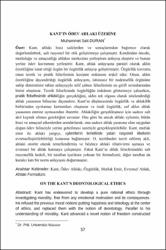| dc.contributor.author | Duran, Muhammet Sait | |
| dc.date.accessioned | 2021-03-29T09:16:50Z | |
| dc.date.available | 2021-03-29T09:16:50Z | |
| dc.date.issued | 2017 | en_US |
| dc.identifier.citation | Duran, M. S. (2017). Kant’ın Ödev Ahlakı Üzerine. Temaşa Erciyes Üniversitesi Felsefe Bölümü Dergisi, (6), 57-84. | en_US |
| dc.identifier.issn | 2148-371X | |
| dc.identifier.issn | 2651-5148 | |
| dc.identifier.uri | https://hdl.handle.net/20.500.12846/556 | |
| dc.description.abstract | Kant, ahlakı hissi saiklerden ve sonuçlarından bağımsız olarak değerlendirerek, salt rasyonel bir etik geliştirmeye çalışmıştır. Kendinden önceki, mutluluğu ve amaçsallığı ahlakın merkezine yerleştiren anlayışı eleştirir ve bunun yerine ödev kavramını yerleştirir. Kant, ahlak anlayışına paralel olarak aklın özerkliğine isnat ettiği özgün bir özgürlük anlayışı geliştirmiştir. Özgürlük kavramı, onun teorik ve pratik felsefesinin kesişme noktasını teşkil eder. Onun, aklın özerkliğine dayandırdığı özgürlük anlayışını, istisnasız bir nedensellik örgüsüne sahip determinist tabiat anlayışıyla telif çabası felsefesinin en girift sorunlarından birini oluşturur. Teorik felsefesinde özgürlüğün imkânını göstermeye çalışırken, pratik felsefesinde ahlakiliğin gerçekliğini, aklın tek olgusu olarak nitelendirdiği ahlak yasasının bilincine dayandırır. Kant‟ın düşüncesinde özgürlük ve ahlakilik birbirinden ayrılamaz kavramları oluşturur ve iradi özgürlük, saf aklın ahlak yasasının emrine uymasından ibarettir. Ahlakiliğin gerçekleşmesi için sadece salt akıl kaynak olması gerektiğini savunur. Ona göre bu ancak ahlaki eylemin, bütün hissi ve amaçsal etkenlerden arındırılarak, onu sadece ahlak yasasına olan saygıdan doğan ödev bilinciyle yerine getirilmesi suretiyle gerçekleştirilebilir. Kant, mutlak emir ile ahlaki yargıyı, eylemlerin temelinde yatan rasyonel ilkelerin evrenselleştirilebilirliği kıstasına bağlamıştır. O, tecrübeden tecrit edilmiş aklı, ahlaki otorite olarak temellendirmiş ve böylece ahlaki rölativizmi aşmaya ve evrensel bir ahlak kurmaya çalışmıştır. Fakat Kant‟ın ahlak felsefesindeki salt rasyonellik hedefi, bir taraftan içerikten yoksun bir formalizmi; diğer taraftan da kuralcı katı bir norm anlayışını doğurmuştur. | en_US |
| dc.description.abstract | Kant has endeavored to develop a pure rational ethics through investigating morality, free from any emotional motivation and its consequences. He refused the previous moral notions putting happiness and teleology at the center of ethics, and replaced them with the notion of deontology. Parallel to his understanding of morality, Kant advanced a novel notion of freedom constructed on autonomy of the reason. The concept of freedom constitutes the crisscrossing point of his theoretical and practical philosophies. His attempt to reconcile his notion of freedom with the deterministic notion of nature, which is based on a web of causality without exception, is one of the most complex problematics of his philosophy. While attempting to demonstrate the possibility of freedom in his theoretical philosophy Kant rests, in his practical philosophy, the reality of morality on the consciousness of the moral law, which he characterizes as the only factuality of the reason. In Kant‟s philosophy, freedom and morality constitute the inseparable terms from one another, and voluntary freedom is nothing but to conform to imperatives of the moral law of pure reason. He claims that pure reason should be the mere source for morality to be realized. This can only be made possible if and when the moral conducts act would be purified from all emotional and purposeful elements and be pursued with a consciousness of duty which stems from the respect for moral law. With his categorical imperative, Kant attributes the moral judgment to the ability of the criterion for the rational principles underlying the moral conducts act that could be universalized. Kant has attempted to overcome the moral relativism, and to construct as well, a universal morality by setting the reason abstracted from experience as the basis for the moral authority. However, attaining the goal of pure rationalism in the Kant‟s philosophy has paved the way for constructing an empty formalism and an ethical rigorism. | en_US |
| dc.language.iso | tur | en_US |
| dc.publisher | Erciyes Üniversitesi | en_US |
| dc.rights | info:eu-repo/semantics/openAccess | en_US |
| dc.subject | Ödev Ahlakı | en_US |
| dc.subject | Mutlak Emir | en_US |
| dc.subject | Evrensel Ahlak | en_US |
| dc.subject | Ahlaki Formalizm | en_US |
| dc.subject | Ethical Formalism | en_US |
| dc.subject | Deontology | en_US |
| dc.subject | Categorical Imperative | en_US |
| dc.subject | Morality | en_US |
| dc.subject | Ethischer Formalismus | en_US |
| dc.subject | Deontologie | en_US |
| dc.subject | Kategorischer Imperativ | en_US |
| dc.title | Kant’ın ödev ahlakı üzerine | en_US |
| dc.type | article | en_US |
| dc.relation.journal | Temaşa Erciyes Üniversitesi Felsefe Bölümü Dergisi | en_US |
| dc.contributor.authorID | 0000-0002-7961-2661 | en_US |
| dc.identifier.issue | 6 | en_US |
| dc.relation.publicationcategory | Makale - Uluslararası Hakemli Dergi - Kurum Öğretim Elemanı | en_US |
| dc.contributor.department | TAÜ, Kültür ve Sosyal Bilimler Fakültesi, Kültür ve İletişim Bilimleri Bölümü | en_US |
| dc.contributor.institutionauthor | Duran, Muhammet Sait | |
| dc.identifier.startpage | 57 | en_US |
| dc.identifier.endpage | 84 | en_US |

















